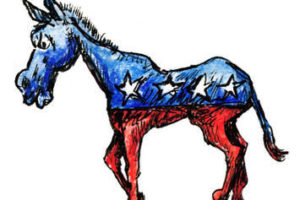Growing up in a socially challenged and economically depressed community such as East Winston-Salem, you rarely see a neighbor or family member go off to college, but if they did, then it was almost with certainty they enrolled in Winston-Salem State University. Founded by Dr. Simon Green Atkins in 1892 as Winston-Salem Teachers College, the school eventually became a four-year institution, and Dr. Atkins supervised a transition from private to state control.
More popularly known as WSSU, the campus is located in the heart of East Winston-Salem and provide a place of hope for young black kids seeking to discover their purpose. Two of my closest aunts attended school there, with two others working at the institution.
A source of economic development, higher education and inspiration – I developed an affinity for the university and their programs. Speaking on campus dozens of times, mentoring students, arranging summer internships and eventually agreeing to teach a commercial real estate development class. Many wondered if the school was my alma mater, although I didn’t attend school at WSSU, it was always important to show my appreciation for all they have done in the community over decades.
Undoubtedly, I grew deeply excited upon learning the Republican Study Committee, along with support from the new administration in the White House, wanted to explore ways to better serve the nation’s Historically Black Colleges and Universities. An investment in HBCUs touches the center of what is ailing many predominantly black communities – lack of economic development opportunities, minimal interest in educational excellence and social circumstances that often impact youth in regressive ways that stifle potential.
During a recent fly-in to the Capitol, over 80 HBCU presidents had the opportunity to engage with congressional leaders, Secretary of Education Betsy DeVos and visited the Oval Office to join President Donald Trump in signing a new executive order for the White House Initiative to Promote Excellence and Innovation at HBCUS. The first president to sign an executive order targeting HBCUs was Jimmy Carter, but historians notate the Democratic President took action for political expediency – desperately needing to increase black voter turnout, Carter issued the order in August 1980.
Sometimes the most noblest goals can be corrupted when motivations are not clear or politics distract from the overall mission. Reagan would later issue the executive order that originally created the White House Initiative. The relationship between HBCUs and the GOP date back to a dinner between Teddy Roosevelt and Booker T. Washington, ever since the party recognized the critical student services the 150 year old institutions provide for the black community. The visit to the Oval Office had well intentions, but still became marred in political missteps – a careless public statement and even a photo that was misconstrued after the executive order signing.
White House Initiative Moved to Executive Office
Insiders leaked to the media that no resources were appropriated for the restructured initiative, angering some college presidents and others eagerly awaiting more federal funding. However, no commitment was made for additional resources prior to the fly-in, and POTUS has no authority to allocate federal resources. Congress must review the request, and then allocate funds through the budgetary process appropriately.
The most important milestone with the executive order was moving the initiative back to the White House, where HBCUs now have greater access to the President and his staff, ensuring a greater probability of being treated as a priority and increasing opportunities for capacity building. It’s worth noting HBCU presidents requested this move during the previous administration after former President Obama signed an executive order in 2012.
Trump’s executive order mandated the creation of an advisory board to provide oversight, report back to the President and leverage the collective expertise of leaders in academia, government, business, philanthropy and military as we reshape the future of our vitally important HBCU institutions. College presidents routinely criticized Obama for choosing not to attend advisory board meetings or the national conference throughout his eight year term.
Effective Communication is Important
Secretary DeVos, newly approved head of the Education Department made a controversial statement that further distracted from the hopeful outcome of the fly-in. “HBCUs are real pioneers when it comes to school choice,” DeVos said. Leaders throughout the black community quickly attacked the statement as being racially insensitive, reminding DeVos that HBCUs were in fact born out of necessity – Jim Crow laws prevented black boys and girls from attending school with their white counterparts. DeVos later corrected the statement, but social media is unforgiving.
Rich DeVos, the billionaire Amway co-founder and father-in-law of Education Secretary DeVos, was a major donor to Howard University. DeVos first act as secretary happen to be meeting with Howard University leadership and staff. Considering her rich family history, you can assume her comments were not based on racial animus, but moreover a failure in word choice and not fully acknowledging the historical context. We are living in one of the most hyper charged environments in American history, social media and 24-hours cable news only add momentum to any sensational news story.
Another way to view her statement is to consider the large number of black students that would not attend college without the existence of HBCUs – barriers to entries at other universities that demand higher eligibility requirements and more tuition fees place traditional HBCU students at a disadvantage. Truly today, HBCUs now exist along the education pathway to provide a “choice” for an under served population.
Politics Obstruct View of the Opportunity
A photo that circulated the Internet like a wildfire, showed a very comfortable Kellyanne Conway kneeling on a couch in the Oval Office. The initial photo made it appear Conway was playing on her phone while Trump met with college presidents, but a later version revealed she was getting in position to snap a photo of the large group. But the damage was done, memes galore flooded social media channels, and many black pundits took to social media to demean the President’s Counselor for her lack of respect, dignity and professionalism. The incident reminded some of a legendary Dave Chappelle episode where “Rick James” puts his feet on Eddie Murphy’s couch, and then bellowed out several well placed expletives.
Nevertheless, the incident severely distracted from the moment, ultimately garbling the message coming out of the White House about a very important initiative.
Where’s the beef?
The executive order signed by Trump is not materially different from those signed by Obama, Bush, Clinton and past executives going back to Carter – but that’s missing the point. Observers should not miss the fact that HBCUs have now been elevated to a high priority, complete with space in the executive office and a presidential appointed executive director that will be able to communicate with top advisors. Obama provided $4 Billion in federal resources over eight years, the new administration is seeking $25 Billion for current needs, including funds to invest in infrastructure, buildings and a wide variety of deferred campus maintenance needs.
Like most of the policies floating around the White House, its far too early to pass judgement on the administration’s intent, some were quick to declare the whole initiative was just a “Black History Month” ploy. But short sighted statements ignore political realities and the slow grind of Washington.
I recall advising a HBCU many years ago that was on the brink of insolvency, unfortunately many of their peers know the feeling all too well. College presidents are not in a position to ignore the POTUS and the massive resources that can follow when he fully supports them – no matter Republican or Democrat. If the White House Initiative to aid HBCUS is successful, over 300,000 rising black leaders could benefit.
Algenon Cash is the managing director of Wharton Gladden & Company, an investment banking firm, he is also a director for the North Carolina Council on Economic Education. Reach him at acash@whartongladden.com.




